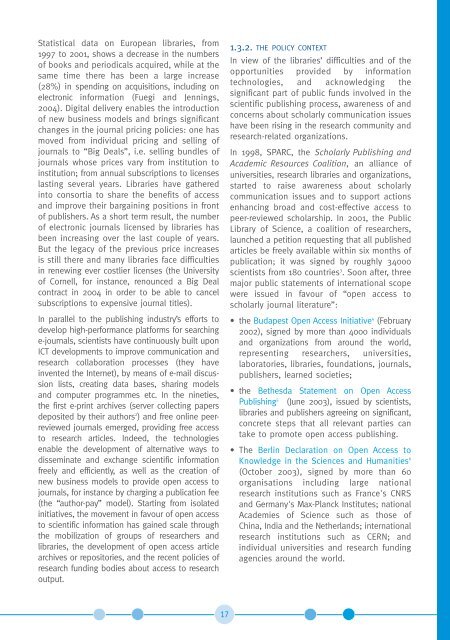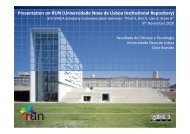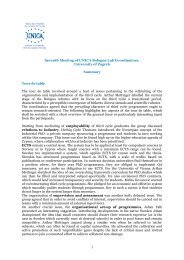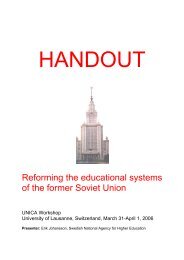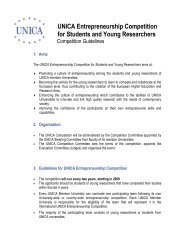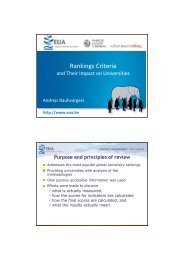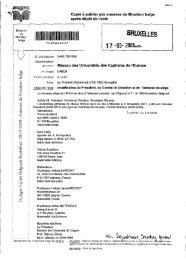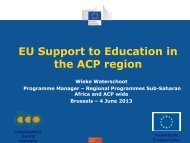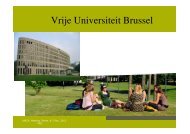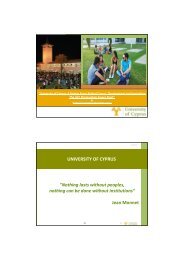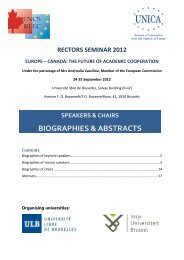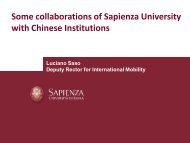Study on the economic and technical evolution of the scientific ...
Study on the economic and technical evolution of the scientific ...
Study on the economic and technical evolution of the scientific ...
Create successful ePaper yourself
Turn your PDF publications into a flip-book with our unique Google optimized e-Paper software.
Statistical data <strong>on</strong> European libraries, from<br />
1997 to 2001, shows a decrease in <strong>the</strong> numbers<br />
<strong>of</strong> books <strong>and</strong> periodicals acquired, while at <strong>the</strong><br />
same time <strong>the</strong>re has been a large increase<br />
(28%) in spending <strong>on</strong> acquisiti<strong>on</strong>s, including <strong>on</strong><br />
electr<strong>on</strong>ic informati<strong>on</strong> (Fuegi <strong>and</strong> Jennings,<br />
2004). Digital delivery enables <strong>the</strong> introducti<strong>on</strong><br />
<strong>of</strong> new business models <strong>and</strong> brings significant<br />
changes in <strong>the</strong> journal pricing policies: <strong>on</strong>e has<br />
moved from individual pricing <strong>and</strong> selling <strong>of</strong><br />
journals to “Big Deals”, i.e. selling bundles <strong>of</strong><br />
journals whose prices vary from instituti<strong>on</strong> to<br />
instituti<strong>on</strong>; from annual subscripti<strong>on</strong>s to licenses<br />
lasting several years. Libraries have ga<strong>the</strong>red<br />
into c<strong>on</strong>sortia to share <strong>the</strong> benefits <strong>of</strong> access<br />
<strong>and</strong> improve <strong>the</strong>ir bargaining positi<strong>on</strong>s in fr<strong>on</strong>t<br />
<strong>of</strong> publishers. As a short term result, <strong>the</strong> number<br />
<strong>of</strong> electr<strong>on</strong>ic journals licensed by libraries has<br />
been increasing over <strong>the</strong> last couple <strong>of</strong> years.<br />
But <strong>the</strong> legacy <strong>of</strong> <strong>the</strong> previous price increases<br />
is still <strong>the</strong>re <strong>and</strong> many libraries face difficulties<br />
in renewing ever costlier licenses (<strong>the</strong> University<br />
<strong>of</strong> Cornell, for instance, renounced a Big Deal<br />
c<strong>on</strong>tract in 2004 in order to be able to cancel<br />
subscripti<strong>on</strong>s to expensive journal titles).<br />
In parallel to <strong>the</strong> publishing industry’s efforts to<br />
develop high-performance platforms for searching<br />
e-journals, scientists have c<strong>on</strong>tinuously built up<strong>on</strong><br />
ICT developments to improve communicati<strong>on</strong> <strong>and</strong><br />
research collaborati<strong>on</strong> processes (<strong>the</strong>y have<br />
invented <strong>the</strong> Internet), by means <strong>of</strong> e-mail discussi<strong>on</strong><br />
lists, creating data bases, sharing models<br />
<strong>and</strong> computer programmes etc. In <strong>the</strong> nineties,<br />
<strong>the</strong> first e-print archives (server collecting papers<br />
deposited by <strong>the</strong>ir authors 2 ) <strong>and</strong> free <strong>on</strong>line peerreviewed<br />
journals emerged, providing free access<br />
to research articles. Indeed, <strong>the</strong> technologies<br />
enable <strong>the</strong> development <strong>of</strong> alternative ways to<br />
disseminate <strong>and</strong> exchange <strong>scientific</strong> informati<strong>on</strong><br />
freely <strong>and</strong> efficiently, as well as <strong>the</strong> creati<strong>on</strong> <strong>of</strong><br />
new business models to provide open access to<br />
journals, for instance by charging a publicati<strong>on</strong> fee<br />
(<strong>the</strong> “author-pay” model). Starting from isolated<br />
initiatives, <strong>the</strong> movement in favour <strong>of</strong> open access<br />
to <strong>scientific</strong> informati<strong>on</strong> has gained scale through<br />
<strong>the</strong> mobilizati<strong>on</strong> <strong>of</strong> groups <strong>of</strong> researchers <strong>and</strong><br />
libraries, <strong>the</strong> development <strong>of</strong> open access article<br />
archives or repositories, <strong>and</strong> <strong>the</strong> recent policies <strong>of</strong><br />
research funding bodies about access to research<br />
output.<br />
1.3.2. THE POLICY CONTEXT<br />
In view <strong>of</strong> <strong>the</strong> libraries’ difficulties <strong>and</strong> <strong>of</strong> <strong>the</strong><br />
opportunities provided by informati<strong>on</strong><br />
technologies, <strong>and</strong> acknowledging <strong>the</strong><br />
significant part <strong>of</strong> public funds involved in <strong>the</strong><br />
<strong>scientific</strong> publishing process, awareness <strong>of</strong> <strong>and</strong><br />
c<strong>on</strong>cerns about scholarly communicati<strong>on</strong> issues<br />
have been rising in <strong>the</strong> research community <strong>and</strong><br />
research-related organizati<strong>on</strong>s.<br />
In 1998, SPARC, <strong>the</strong> Scholarly Publishing <strong>and</strong><br />
Academic Resources Coaliti<strong>on</strong>, an alliance <strong>of</strong><br />
universities, research libraries <strong>and</strong> organizati<strong>on</strong>s,<br />
started to raise awareness about scholarly<br />
communicati<strong>on</strong> issues <strong>and</strong> to support acti<strong>on</strong>s<br />
enhancing broad <strong>and</strong> cost-effective access to<br />
peer-reviewed scholarship. In 2001, <strong>the</strong> Public<br />
Library <strong>of</strong> Science, a coaliti<strong>on</strong> <strong>of</strong> researchers,<br />
launched a petiti<strong>on</strong> requesting that all published<br />
articles be freely available within six m<strong>on</strong>ths <strong>of</strong><br />
publicati<strong>on</strong>; it was signed by roughly 34000<br />
scientists from 180 countries 3 . So<strong>on</strong> after, three<br />
major public statements <strong>of</strong> internati<strong>on</strong>al scope<br />
were issued in favour <strong>of</strong> “open access to<br />
scholarly journal literature”:<br />
• <strong>the</strong> Budapest Open Access Initiative 4 (February<br />
2002), signed by more than 4000 individuals<br />
<strong>and</strong> organizati<strong>on</strong>s from around <strong>the</strong> world,<br />
representing researchers, universities,<br />
laboratories, libraries, foundati<strong>on</strong>s, journals,<br />
publishers, learned societies;<br />
• <strong>the</strong> Be<strong>the</strong>sda Statement <strong>on</strong> Open Access<br />
Publishing 5 (June 2003), issued by scientists,<br />
libraries <strong>and</strong> publishers agreeing <strong>on</strong> significant,<br />
c<strong>on</strong>crete steps that all relevant parties can<br />
take to promote open access publishing.<br />
• The Berlin Declarati<strong>on</strong> <strong>on</strong> Open Access to<br />
Knowledge in <strong>the</strong> Sciences <strong>and</strong> Humanities 6<br />
(October 2003), signed by more than 60<br />
organisati<strong>on</strong>s including large nati<strong>on</strong>al<br />
research instituti<strong>on</strong>s such as France's CNRS<br />
<strong>and</strong> Germany's Max-Planck Institutes; nati<strong>on</strong>al<br />
Academies <strong>of</strong> Science such as those <strong>of</strong><br />
China, India <strong>and</strong> <strong>the</strong> Ne<strong>the</strong>rl<strong>and</strong>s; internati<strong>on</strong>al<br />
research instituti<strong>on</strong>s such as CERN; <strong>and</strong><br />
individual universities <strong>and</strong> research funding<br />
agencies around <strong>the</strong> world.<br />
17


